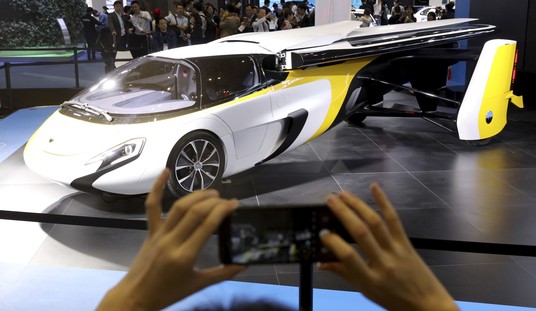Green activists preach about renewable energy sources, using words like ‘holistic’ and ‘sustainable’. Wind energy is one of their favorites; nothing is as free as the wind, n’est-ce pas?
If we truly consider the holistic environmental impact of wind turbines on the environment and the economy, it’s not a pretty picture. Nor is it sustainable.
We’ve previously looked at the reliance of giant wind turbines on rare earth minerals such as neodymium (for example, here and here). Most of the world’s supply of those minerals comes from China. In a new report, the Daily Mail (UK) takes a close look at the state of environmental stewardship in the People’s Republic’s rare earth mining industry.
In China, the true cost of Britain’s clean, green wind power experiment: Pollution on a disastrous scale
The reality is that, as Britain flaunts its environmental credentials and unspoiled moors and mountains with thousands of wind turbines, it is contributing to a vast man-made lake of poison in northern China. This is the deadly and sinister side of the massively profitable rare-earths industry that the ‘green’ companies profiting from the demand for wind turbines would prefer you knew nothing about.

Look closely at the pictures accompanying the article. Near the metals refinery, there is a toxic tailings pit that looks like the surface of the moon; not a blade of grass will grow. It measures six miles across.
There is an important lesson here. Totalitarian government bureaucracies are the world’s worst environmentalists. The legacy of the Soviet Union and of the People’s Republic of China is of devastation of the landscape on a scale that it can be observed from earth orbit. That’s one reason I distrust the EPA: In their first 30 years or so they did a decent job of cleaning up our skies and waterways. Their current push to regulate carbon dioxide is not about cleaning up the environment (as CO2 is not toxic or harmful to anyone’s health as a constituent of 0.4% of the atmosphere); regulation of CO2 is about control of the economy, pure and simple. If you control CO2 you control every factory and just about anything that moves.
Aside from environmental calamity, we have the dubious economics of wind energy. The UK has instituted a measure called the Renewable Obligation (RO), a governmental mandate which increases proportions of renewables in the electrical generating mix. Two problems with that: 1) wind energy is unreliable, necessitating conventional backup power for those times (especially in winter) when demand is high and the wind is not blowing; and 2) wind energy is expensive, roughly twice the cost of conventionally-generated electricity.
Generous state subsidies to reenewable energy producers are passed on to the consumers’ utility bills, in effect a non-tax tax. By 2020, when 15% of total energy consumption (meaning 30% of electricity) must come from renewables, it is estimated that the cost of electricity will increase by nearly a third for both residential and industrial users.
By 2020, environmental regulation will be adding 31 percent to our [residential] bills. That’s £160 [$258] green tax out of and average annual bill of £512 [$825]. As costs rise, more people will be driven into fuel poverty.
Indeed.
The notion that wind energy is as “free as the wind” encapsulates the fundamental conceit of the green energy movement and the politicians who sustain it. We all expect energy to available and in sufficient supply whenever we flip a switch or press on the accelerator pedal. Providing that power takes infrastructure, engineering and investment on a massive scale. Any technology that can be scaled up to provide a meaningful share of that demand will, almost by definition, have a measurable environmental and societal cost. The wise move is to consider all of the costs and all of the benefits of all of our options. We need make choices based on rational common sense, not emotion.
Update: Don’t forget about the birds and the bats.














Join the conversation as a VIP Member